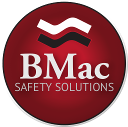Confined Space Training (1 day)
About Confined Spaces
A confined space can be defined as any environment that is dangerous due to the enclosed nature of the space. Examples of enclosed spaces include tanks, cellars, pits etc.
The dangers associated with confined spaces include:
- Toxic or harmful fumes, gasses, or vapours in the space
- Lack of oxygen that may lead to suffocation
- Excessive oxygen which could result in increased risk of file
- High temperatures
- Free flowing solids of liquids that may lead to drowning, asphyxiation or other injuries
- Explosive or flammable atmospheres
It is the responsibility of every employer to ensure that any staff who work in confined spaces are aware of the potential hazards associated with confined spaces and the processes and procedures for entering a confined space, raising an alarm if necessary, use of personal protection equipment and rescue.
BMAC safety offers 1 and 2 day Confined Spaces courses for staff. The content of the 1 day course is shown below.
Course Objectives
The aim of this course is to:
- Give participants an insight into confined space work and the associated hazards;
- Make sure participants are capable of putting in place a safe system of work for working in confined spaces;
- Ensure participants understand definition of a confined space and can decide on what is and isn’t a confined space as defined in the ICOP 2010 for Confined Spaces;
- Make sure participants know what to do in the event of an emergency in a confined space;
- Make participants aware of legislation with respect to Confined Spaces in the Workplace.
Course Contents
- Legislation with respect to confined spaces
- Case Histories and fatalities with respect to confined spaces
- Pertinent Hazards and risks associated with working in confined spaces
- Safe systems of work, Safe procedures and safe equipment
- Permit to Work Systems and Method Statements, Controlling the space
- Gas detectors, Tripods Winches Harnesses and Ex rated equipment
- Employee responsibility when working in confined spaces
- Atmospheric monitoring, Gas detection equipment
- Gain knowledge of rescue procedures
- Theory and practical exercise
Who should attend the Training
- People who have to enter confined spaces to work
- Supervisors of confined spaces
The confined Space course is relevant to Managers, Supervisors and operators who may need to enter into or supervise entry into Confined Spaces and carried out work in a confined space. For example, maintenance or cleaning operations or Routine inspections, CCTV operations and survey etc. Drain cleaners and repairers, Plant maintenance personnel etc. People who enter Vats, Silos and Storage Vessels and may use breathing apparatus.

Brendan McAuliffe
Trainer / Instructor
Brendan McAuliffe has 25 years industrial work experience holding facilities managers’ role in both high volume manufacturing and in the pharmaceutical industry. He understands at first hand the employers’ duty with respect to health and safety management to their employees. The primary duty of the employer under the SHW@W Act 2005 is to provide a safe place of work for their employees and anyone affected by their business. Safety and health management ultimately means creating an environment free from the risk of injury and ill health. So it is not just focusing on safety issues but also the long term effects of the working environment on workers’ health, i.e exposure to noise, vibration, active pharmaceuticals, solvents, paints, boring repetitive work etc.
Brendan has a 1st Class hons. degree in Health and safety from the University of Limerick.
He is also and Irish Heart Foundation and Pre Hospital Emergency Care BLS and CFR Instructor.
He has a Foundation Diploma in Education from University College Galway.
He is a breathing apparatus instructor from International Fire Training Centre in the UK.
He is a QQI approved First Aid and Manual Handling trainer and a PHECC approved FAR Instructor.
He has 10 years Safety Consultancy experience working with small and medium entreprises and also multinationals.
He has also instructed on both the PSCS and PSDP courses.
Ready to get started?
Get in touch, or give me a call!



